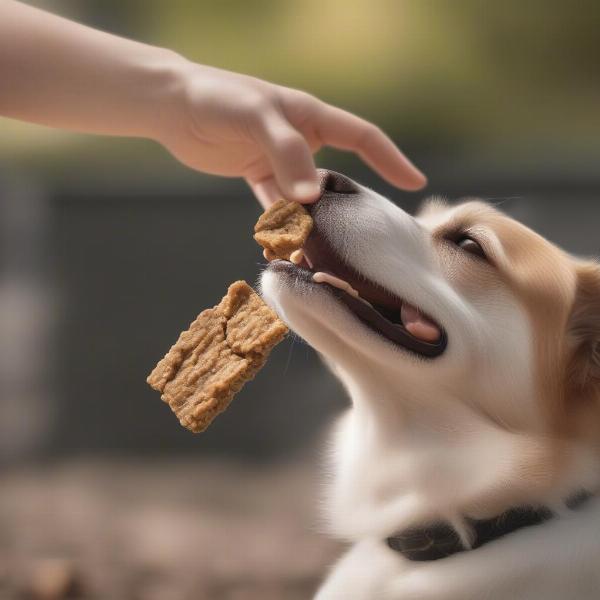Agave nectar is a popular natural sweetener, often touted as a healthier alternative to sugar. But what about our furry friends? Can dogs eat agave? The short answer is no. While not acutely toxic, agave nectar offers no nutritional benefits for dogs and can even lead to digestive upset and other health issues. This article will explore the reasons why agave is not recommended for canine consumption and offer safe alternatives to satisfy your dog’s sweet tooth.
Why Agave is Not Recommended for Dogs
While agave is marketed as a natural and healthy sweetener for humans, it’s not a good choice for dogs. The primary concern is the high fructose content. Dogs metabolize fructose differently than humans, and consuming large amounts can lead to digestive problems like diarrhea and vomiting. Furthermore, agave’s high sugar content contributes to weight gain, dental issues, and can exacerbate conditions like diabetes in predisposed dogs. Instead of agave, opt for dog-specific treats or small amounts of fruits like apples or bananas (in moderation). These provide nutritional benefits along with a touch of sweetness.
The Dangers of High Fructose in Agave for Dogs
Fructose, the main type of sugar in agave, poses specific risks for dogs. Their bodies aren’t equipped to efficiently process large amounts, which can overwhelm the digestive system. This can lead to a range of unpleasant symptoms, from mild gas and bloating to severe diarrhea and vomiting. In the long term, excessive fructose consumption can contribute to obesity, insulin resistance, and even pancreatitis, a serious and potentially life-threatening inflammation of the pancreas.
Understanding Fructose Metabolism in Dogs
Unlike humans, dogs don’t have the same enzymes necessary to break down fructose effectively. This means that a much larger percentage of ingested fructose reaches the large intestine undigested. In the large intestine, gut bacteria ferment the fructose, producing gas and leading to digestive discomfort. This difference in metabolism makes fructose significantly less tolerable for dogs compared to humans.
Safe and Healthy Alternatives to Agave for Dogs
If you’re looking to give your dog a treat, many safe and healthy options exist. Specifically formulated dog treats are a great choice, as they are designed with canine nutritional needs in mind. Look for treats that are low in sugar and made with wholesome ingredients. Small pieces of fruits like apples (without the core and seeds), bananas, or blueberries can also be offered in moderation. These offer natural sweetness along with vitamins and antioxidants. Remember to avoid artificial sweeteners like xylitol, which is highly toxic to dogs.
 Dog Enjoying Healthy Treats
Dog Enjoying Healthy Treats
Conclusion
While agave may be a natural sweetener for humans, it’s not suitable for our canine companions. The high fructose content can cause digestive upset and contribute to long-term health problems. Prioritize your dog’s well-being by choosing safe and healthy alternatives, such as dog-specific treats or small portions of suitable fruits. can dogs eat agave syrup should be avoided. Opting for healthier treats, like dental treats for dogs, is always a good idea. And if you’re looking for ways to celebrate with your furry friend, check out our guide to dog themed cocktails (for humans, of course!).
FAQ
- What should I do if my dog accidentally eats agave? Monitor your dog for any signs of digestive upset, such as vomiting or diarrhea. If symptoms are severe or persistent, contact your veterinarian.
- Are there any types of sweeteners that are safe for dogs? Small amounts of honey or maple syrup are generally safe, but should be given sparingly. Xylitol is highly toxic and should be avoided at all costs.
- What are some healthy treat options for dogs besides fruit? Dog-specific treats, carrots, plain cooked chicken or sweet potato are all healthy options.
- Can agave cause allergies in dogs? While less common than other food allergies, some dogs may be sensitive to agave.
- Is agave nectar worse for dogs than table sugar? Both agave nectar and table sugar should be limited in a dog’s diet due to their high sugar content.
- How can I prevent my dog from accessing agave? Store agave and other sweeteners out of your dog’s reach, in cupboards or pantries.
- What are the signs of pancreatitis in dogs? Signs include vomiting, diarrhea, loss of appetite, lethargy, and abdominal pain.
About ILM Dog
ILM Dog is your trusted international resource for all things dog-related. We provide expert advice on dog breeds, health, training, nutrition, grooming, and much more. Our mission is to empower dog owners worldwide with the knowledge and resources they need to provide the best possible care for their furry companions. For expert guidance on dog nutrition and care, contact us at [email protected] or +44 20-3965-8624. Visit ILM Dog for more information.